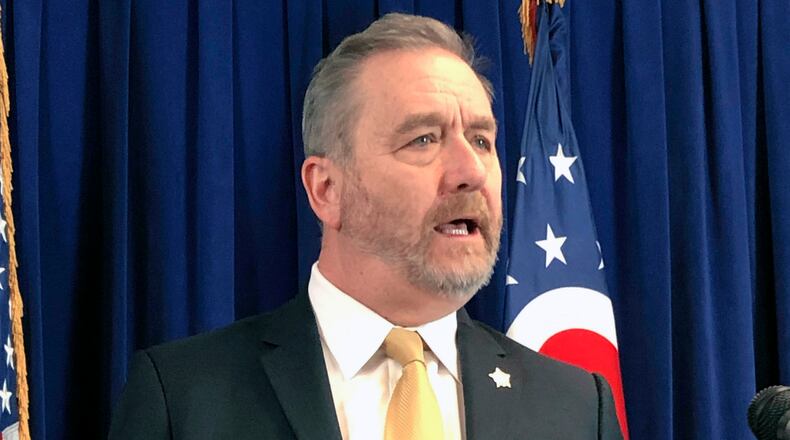Yost held a virtual press conference after that court hearing to lay out the state’s position.
“This case is not about the wisdom of mandates — or, excuse me, not about the wisdom of vaccines,” Yost said. “This case is about the law.”
Yost said he has had the disease himself, is fully vaccinated and has taken a booster shot. He encouraged Ohioans to get vaccinated, saying it’s “the right choice for most of us.”
Ohio Solicitor General Ben Flowers argued the case Friday on behalf of 27 states, though he and Louisiana’s solicitor general had to do so remotely because they both tested positive for COVID-19. Yost said Flowers’ symptoms were mild.
Flowers’ argument cited Biden Chief of Staff Ron Klain’s September retweet of a statement from MSNBC anchor Stephanie Ruhle that the OSHA mandate was “the ultimate work-around” to require vaccination, Yost said.
Imposing any such national requirement is properly the role of Congress, but “they” — apparently meaning Democrats — don’t have sufficient votes there to do so, he said.
Even if Congress did mandate vaccines, Yost said, he would argue that health regulations “predominantly belong to the states.” And there’s not much chance of that happening in Ohio, he said. Republicans hold a supermajority in both houses of the General Assembly and have submitted numerous bills to block COVID-19 vaccination requirements, though none has yet passed.
Yost introduced Clara Osterhage, a member of the National Federation of Independent Businesses leadership council. The Dayton-area businesswoman is the nation’s largest franchise owner of Great Clips hair salons, and Yost said NFIB is a co-plaintiff in the case.
Osterhage said she owns 81 Great Clips locations and employs 630 licensed cosmetologists, with each location having five or six on duty any given day. Testing those employees weekly would be “insurmountable,” and anyone who refused vaccination or regular testing could leave her stores for a small shop down the street, making her current staffing shortage worse, she said.
Osterhage believes the federal mandate for large employers would force her out of business, and predicted the same for many others.
“This is not something the employer should be prescribing for anybody,” she said.
Osterhage said she is fully vaccinated and boosted.
“But that’s my personal choice,” she said.
The Biden Administration maintains that its mandates will be upheld.
“Especially as the U.S. faces the highly transmissible Omicron variant, it is critical to protect workers with vaccination requirements and testing protocols that are urgently needed,” says a White House Dec. 22 statement. “At a critical moment for the nation’s health, the OSHA vaccination or testing rule ensures that employers are protecting their employees and the CMS health care vaccination requirement ensures that providers are protecting their patients.”
The vaccination, testing and mask requirements are due to go into effect Monday. Attorneys general from 27 Republican-dominated states and other plaintiffs joined in asking the Supreme Court to stay its implementation.
“When the scope of OSHA’s workplace-related authority is properly defined, the vaccine mandate is blatantly illegal,” the states’ brief says, according to Yost’s office. “The mandate acknowledges that the risk of contracting COVID-19 is inherent in human interaction … Thus, the danger arises not from work, but from routine human interaction. And so it is not work-related.”
Yost said he believes the court will act quickly, and he’s encouraged by justices’ questions on Friday; though one from Justice Amy Coney Barrett suggests a narrow ruling is possible that leaves open the possibility of a renewed mandate through federal agencies’ normal “notice and comment” procedure.
The Buckeye Institute, an Ohio-based conservative/libertarian think tank, issued a statement following the court’s oral arguments. Robert Alt, Buckeye Institute president and CEO, is a lawyer representing two companies that are parties to the lawsuit.
“If OSHA’s unlawful vaccine mandate is allowed to take effect on Monday, it will catalyze predictably devastating consequences on the supply chain and impose irreparable economic harm upon companies including our clients, Phillips Manufacturing and Tower Co. and Sixarp LLC, which respectively manufacture and package goods used by consumers every day and are both vital to the supply chain,” Alt said in the news release. “The U.S. Supreme Court should issue a stay immediately to clarify the limits of OSHA’s authority and prevent the fallout that is certain to follow.”
The court also heard arguments Friday against a vaccine requirement for many health care workers. Yost’s office is a party to that suit, as well as two related cases against mandates for federal contractors and Head Start instructors.
About the Author

